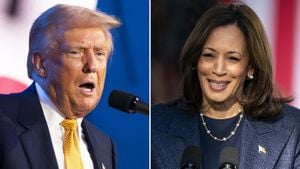American presidential elections serve as poignant reflections for the nation, highlighting not only its core values and aspirations but also the underlying grievances seeking resolution. November 2024 saw such reflection when voters cast their ballots, offering Donald Trump significant victories across many contested states.
The election results revealed several truths about America’s political climate, prominently featuring public anxiety surrounding democracy itself. Many voters who supported Trump articulated their concerns about the state of democracy, which they felt was on shaky ground. Despite Trump's penchant for casting the country and its political opponents—most notoriously labeling his adversaries as 'communists' and 'stupid'—a considerable number of voters did not abandon him. Approximately 10% of voters, even with the looming threat of authoritarianism over the nation, still opted for his leadership.
This paradoxical situation raises numerous questions. How could voters express concerns about democracy yet still support someone who has consistently undermined its principles? The answer lies partly within the discontent surrounding the existing political structure. Nearly 40% of Trump voters expressed desires for complete upheaval, viewing Trump's controversial rhetoric and policies as necessary steps toward change. Many feel disillusioned with traditional politics, leading them to embrace Trump's brashness and willingness to shake up the system.
Trump’s return to the political forefront means possible ramifications for American democracy. His promise to disrupt what he refers to as ‘democracy's pillars’ is seen by supporters as revitalizing, whereas critics warn of its potential to undermine the very fabric of democratic governance. Notably, he has openly suggested disenfranchising voters and undermining media credibility, initiatives viewed as tactics to consolidate power.
After his electoral successes, Trump indicated intentions to act decisively, focusing on marginalizing opposition and questioning electoral processes when they do not yield his desired results. His comments throughout the campaign reinforced the belief among his supporters of needing to ‘fix’ electoral outcomes, which reflects broader anxieties about trust and transparency within the U.S. democratic system.
The political narrative surrounding Trump's candidacy this time resonates deeply among his base. Relentlessly, he has characterized the political elite as detached, fostering the narrative of the 'us versus them' dynamic. Many believe their voices went unheard and their needs ignored by establishment politicians, which contributes to their readiness to stand by Trump, regardless of the negative outcomes his governance may invite.
Comparatively, Trump's rhetoric also mirrors historical authoritarian trends globally, raising alarm. Analysts note connections between Trump's campaigns and strategies employed by authoritarian leaders worldwide, where undermining established norms and questioning electoral integrity are employed to exert and maintain control. The potential for such tactics to take root within the American political scene cannot be understated.
Embedded within these elections is the unavoidable reality of political identity. For Trump supporters, embracing controversy and polarization has become intrinsically tied to their identity, leading to paradoxical engagement. This signals how electoral choices reflect more than just policies—they encapsulate identity, loyalty, and even rebellion against the norm.
Much is yet to be determined about the dynamics of Trump’s potential second term. Will he continue promoting divisive rhetoric? Will he follow through on promises to reshape democratic structures? These uncertainties create heightened vigilance among both supporters and opponents. The upcoming months promise to depict how these tensions will play out against the backdrop of world affairs.
Political analysts are also pondering how the Democratic Party responds to Trump's resurgence. Key pieces of this dynamic will involve shifting strategies reflecting the electorate's dissatisfaction with conventional politics. The political atmosphere post-election would require innovation—catering to voters seeking substantive change, perhaps moving away from traditional political messaging.
Voter turnout this election also suggests increasing polarization among Americans, with identity becoming ever more politicized. Decisions taken at the ballot might increasingly align with cultural affiliation rather than ideological beliefs. This trend indicates growing divisions, reinforcing the idea of two disparate Amercias—one fervently supporting Trump and another steadfastly opposing him.
Looking forward, the fear of authoritarianism is not merely rhetorical but manifests within broader societal fears about freedom and governance. Groups advocating for civil liberties and those focused on democratic integrity now face significant challenges. They reflect sentiments of Americans concerned about rights erosion and shared societal values.
Trump supporters often echo their belief system through claims of loyalty to their perceived American values. The emotional connection to this perspective provides fertile ground for high turnout and persistent support. These dynamics indicate the potential for continuing volatility surrounding the malleability of American political culture, identity, and foundational values.
With Trump poised for action and potentially steering his administration's direction significantly away from traditional democratic practices, it will be pivotal to observe how this influences not only political discourse but also the very fabric of American governance moving forward. The road laid before his administration raises questions of accountability, respect for democratic norms, and public response to perceived threats against cherished ideals.
November's results gradually showcased America's complicated relationship with its democratic foundations—a kingdom often fraught with dissatisfaction interwoven with echoes of nostalgia. The nation's principles face intense scrutiny, leaving many wondering what the future holds for the ideals upon which America was built.



